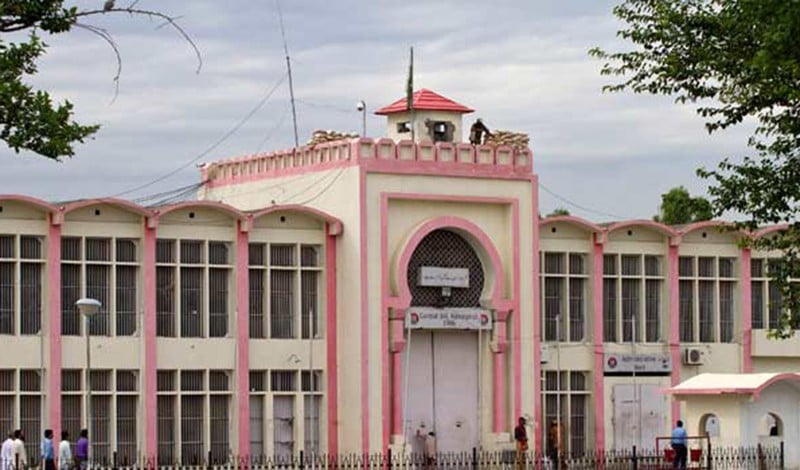
Currently Adiala Jail holds double the number of prisoners it is officially allowed to accommodate. More than half of them still have their cases pending in court while hundreds suffer from severe illnesses

In shocking revelations about prisoners’ health at the overpopulated Adiala Jail in Islamabad more than 17 percent inmates are suffering from severe diseases including HIV/AIDS, cancer, heart and several other life-threatening ailments.
The overcrowded Adiala Jail currently houses 5,258 prisoners which is more than double of the authorised accommodation capacity of 2,174. The available figures show that 55 percent of the total population are under trial and 45 percent have been convicted by courts. The data shows that there are 2,897 under-trial prisoners alongside 2,361 convicted ones. Among these, 142 are female, four of whom are pregnant, as per data collected on January 3, 2019.
Overpopulation is one of the reasons for health concerns among prisoners. Usman Khan, not his real name, who is currently on bail from Adiala says that the jail hospital is not less than a rest house for wealthy and influential prisoners, whereas the other prisoners are only shifted to the hospital in case of severe health emergency or when they pay a bribe to the duty officials. The jail administration shifts VIP prisoners to the hospital where they get a bed, and are able to avail good food, medicines and other facilities.
According to the information obtained through the Right to Information Act (RTI), 868 prisoners at Adiala Jail are suffering from severe diseases. The screening tests of the prisoners were conducted on April 2, 2018. According to available data, 29 prisoners were diagnosed with HIV/AIDS, 55 with heart diseases, 169 with hepatitis, while 60 inmates were suffering from asthma, 254 were diagnosed with diabetes and 300 were suffering from hypertension. A female prisoner was also diagnosed with cancer.
The screening tests of the prisoners were conducted at the jail’s hospital as well as District Headquarter Hospital (DHQ) Rawalpindi under the Punjab Aids Control Program, Pakistan Institute of Medical Sciences (PIMS) and Rawalpindi Institute of Cardiology (RIC).
When contacted, Doctor Ibrar who has served at the jail hospital as Medical Officer declined to comment on the hurdles common prisoners face in gaining access to the jail hospital.
Available data shows that the jail hospital has facilities like a medical store and a mini operation theatre where minor surgeries are conducted. It also has an ECG machine, an ultrasound machine, an X-ray machine and other basic medical equipment, as well as two ambulances for emergency. The hospital also has the facility of a mini laboratory that conducts tests for blood sugar, blood grouping, urine examination, pregnancy and others basic tests. The jail hospital also includes an 80-bed ward.
Deputy Superintendent Adiala Jail, Malik Liaquat accepted that food for all prisoners including patients is the same, however, if the doctor recommends any special diet plan for a prisoner then they arrange it, while the medicines are provided free of cost to all the prisoners as per doctors’ prescription.
Usman Khan says prisoners who are suffering from diseases of a severe nature are provided the same meals as the rest of the prisoners. "If someone can afford a private meal they are either allowed to cook their own or order food from the private canteen on the jail premises, whose quality is a bit better than food provided in the jail," he maintains.
He says that although there is a medical store in the jail and officials of the jail administration claim that all the required medicines are provided to prisoners free of cost, but when prisoners actually need these medicines, they are told that they are out of stock.
Samina Zahur, in charge of the Socio Economic Rehabilitation Centre of the Social Welfare Department in Adiala Jail says their top priority is the facilitation of female and juvenile prisoners, however, if the jail administration demands any support for male prisoners, we are also open to that.
She adds, we periodically arrange medical camps, awareness seminars and character-building lectures for female prisoners.
According to available data, there are 142 female prisoners out of which 24 female prisoners have their children living with them in the jail. Moreover, there are 53 juvenile offenders.
Advocate Liaquat Banuri, who is CEO of Society for Human Rights and Prisoners’ Aid (SHARP), says all human beings, including prisoners, are entitled to all basic facilities including healthcare, hygienic food and proper medical checkups, but unfortunately prisons are neglected by every government, even the incumbent government of Pakistan Tehreek-e-Insaf. He says that there is a dire needed for introducing reforms in prisons to mitigate the sufferings of prisoners.
Deputy Superintendent of the jail says that periodically the honourable judges conduct visits to the jail, and no complaint regarding hurdles in access to the hospital is ever received.
Punjab provincial Minister for Prisons, Zawar Hussain Warraich says that the provision of quality food and healthcare facilities to prisoners is the ministry’s priority, for which negotiations are underway with some NGOs. "I will personally investigate the problems being faced by prisoners, specially those who are suffering from diseases and will take action against officials found guilty of negligence," he promised.